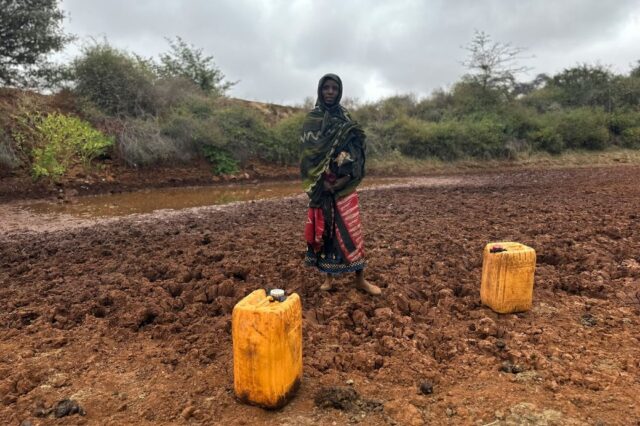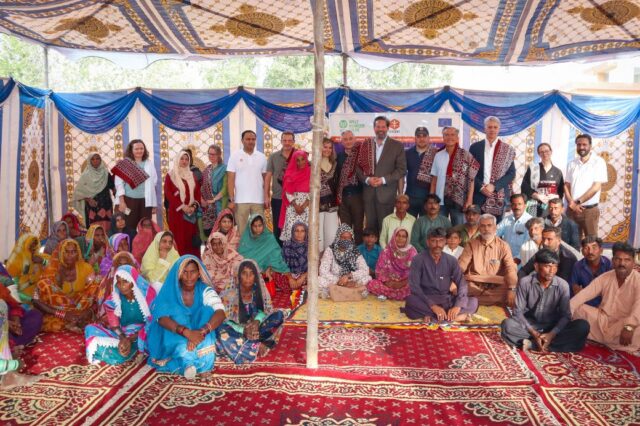96 million people in 18 countries affected in 2024, 24 million more than the previous year. 393 natural disasters recorded, impacting 167 million people. CESVI’s appeal ahead of COP30: “The climate crisis is eroding the very foundations of food security. Immediate large-scale action is needed against the environmental crisis — one of the main drivers […]
ContinueEU Delegation visits CESVI projects in Pakistan: a shared commitment to climate resilience
A delegation from the European Parliament has recently visited several emergency interventions supported by the European Union and implemented by CESVI in the Sindh province of Pakistan, aimed at strengthening the resilience of local communities in the face of natural disasters and the effects of climate change. The mission, composed of five Members of the […]
ContinuePakistan overwhelmed by monsoon rains: flood emergency strikes again
Pakistan is one of the countries most vulnerable to climate change, with extreme events such as heatwaves, torrential rains and flash floods shaping the lives of millions of people, with devastating consequences for the economy and the survival of rural communities. The 2022 floods, which submerged one third of the country, remain an open wound. […]
ContinuePakistan: Strengthening Climate Resilience through Anticipatory Action
Pakistan is among the countries most severely affected by the impacts of climate change. According to the Climate Risk Index 2025, it was ranked as the most vulnerable country in 2022 due to extreme events such as the devastating floods that submerged one-third of the national territory, causing over 1,700 deaths and an estimated $40 […]
ContinueClimate emergency: CESVI stands by Pakistan, one of the countries most affected by the climate crisis
According to the United Nations*, the last eight years have been the hottest ever: rising global temperatures and climate shocks are deepening the vulnerability of entire populations around the world, contributing to the escalation of a dangerous cycle of lack of livelihoods, increased displacement, and impact on the spread of disease. In 2023 alone – […]
ContinueFloods in Pakistan: our response to the climate crisis
In 2022, during the monsoon season, Pakistan experienced one of the worst humanitarian disasters in its history. The torrential rains, up to 5 times more intense than the average of the last 30 years, combined with the rapid melting of glaciers caused by an anomalous heatwave, led to violent floods that submerged a third of […]
ContinueFlood emergency in Pakistan: with People In Need to ensure women’s dignity
The year 2022 was a terrible year for Pakistan marked by the worst flooding in the country’s history, which was one-third submerged by water. A humanitarian catastrophe that well represents the increasingly devastating effects of the climate crisis: since the beginning of summer 2022 torrential rains – up to 5 times more intense than the average of the last 30 years – have hit the Region.
ContinueCESVI still on the front line to support Pakistan, devastated by the climate crisis
We at CESVI have been present in Pakistan since 2005, reaching more than 2.5 million beneficiaries. We have been operating in Sindh for years, where we help local communities and authorities to improve their disaster response capabilities with training activities aimed at improving crisis response capabilities. We have also arranged for the creation of river water monitoring systems that make it possible to control the level of watercourses and to prepare for the impact of floods, once the alert threshold has been reached.
ContinueClimate emergency in Pakistan: ever-increasing numbers and an escalating humanitarian crisis
In Pakistan, over 7 million children and women need immediate access to nutritional and health services and some 5.5 million people lack access to safe drinking water. In the fragile segment of the population, 4 million children do not have access to health services (OCHA, 2022).
In flood-affected areas of Sindh and Balochistan, outbreaks of waterborne diseases continue to increase, particularly due to the unavailability of health facilities and the disastrous consequences of standing water.








